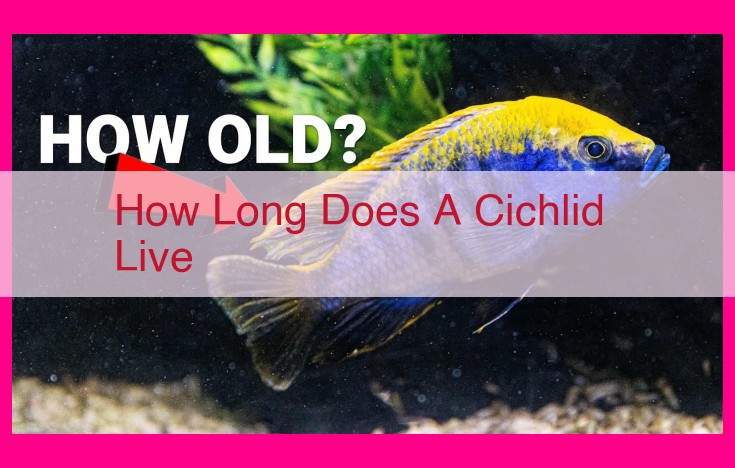Longevity Of Cichlids: Understanding Factors Influencing Lifespan

The lifespan of a cichlid varies depending on species, size, genetics, and environmental factors. Smaller species typically live for 5-8 years, while larger ones can reach up to 15-20 years. Optimal water quality, proper nutrition, and a suitable habitat can contribute to a longer lifespan. Factors such as disease outbreaks or genetic defects can shorten the longevity of a cichlid.
Biological Factors: The Foundation of Aquarium Fish Health
Aquarium fish health is a delicate balance that relies on a combination of biological and environmental factors. Understanding these factors is crucial to maintaining a thriving underwater ecosystem.
Species-Specific Considerations
Different fish species have unique needs and compatibility levels. Failure to consider these differences can result in aggression, territorial disputes, and even illness. Thoroughly research your intended species to ensure they are suitable for your aquarium setup and compatible with any existing inhabitants.
Size Matters
Consider the potential growth size of your fish. Overcrowding can lead to stress, disease, and stunted growth. Provide ample swimming space and hiding places to ensure a comfortable environment for all.
Nutrition for Health and Well-Being
A balanced and species-appropriate diet is essential for fish’s growth and well-being. Feed your fish a variety of live, frozen, or dried foods to meet their nutritional requirements. Avoid overfeeding, as it can lead to water quality issues and health problems.
Genetics and Health
Breeding and selective breeding practices can significantly influence fish’s disease susceptibility and overall health. Choose fish from reputable breeders with a history of producing healthy specimens. Proper quarantine procedures can help prevent the introduction of diseases into your aquarium.
Disease Management
Regularly observe your fish for signs of illness. Early detection and treatment are crucial for maintaining a healthy aquarium. Learn to identify common fish diseases and seek professional veterinary advice when necessary.
Environmental Factors: Creating an Optimal Habitat for Aquarium Fish
When it comes to maintaining a healthy and thriving aquarium, providing a suitable environment plays a crucial role. Just as humans require a nurturing habitat, aquarium fish have specific needs that must be met to ensure their well-being. Understanding and addressing these environmental factors are paramount for creating an optimal underwater oasis for your finny friends.
Water Quality: A Lifeline for Aquarium Health
The foundation of a healthy aquarium lies in impeccable water quality. Dissolved oxygen is essential, as fish extract it from the water to breathe. pH levels must be carefully monitored and maintained within the specific range required by the fish species in your tank. Ammonia and nitrite levels should be kept at zero, as these compounds are toxic to fish. Regular water testing and filtration are crucial to maintaining a pristine aquatic environment.
Tank Size and Setup: Providing a Space to Thrive
Tank size matters! Provide your fish with ample swimming space to prevent overcrowding and stress. Hiding places are essential for fish to feel secure and reduce aggression. Consider incorporating plants, caves, or other structures to offer a variety of hiding options. Stimulation is key to keeping fish active and engaged. Add live plants, driftwood, or toys to maintain their interest and provide mental enrichment.
Filtration and Water Circulation: The Life Support System
Filtration is essential for removing waste and debris, keeping the water clean and healthy. Choose a filtration system that suits the size and population of your tank. Adequate water circulation ensures that the entire tank is properly oxygenated and prevents stagnant areas.
pH and Water Hardness: Matching the Natural Environment
Different fish species have specific pH and water hardness requirements. Conduct research on the fish you intend to keep and adjust your aquarium water accordingly. Sudden changes in pH or water hardness can be detrimental to fish health.
Temperature: Regulating a Comfortable Home
Temperature plays a pivotal role in fish metabolism and overall well-being. Research the optimal temperature range for your specific fish species and use a heater to maintain it. Avoid drastic fluctuations, as rapid temperature changes can stress the fish and compromise their health.
Providing a suitable environment for your aquarium fish is not just a matter of aesthetics; it’s a matter of their health and happiness. By understanding and addressing the environmental factors discussed above, you can create an optimal habitat where your finny friends can thrive and flourish. Remember, a healthy aquarium is a beautiful aquarium, bringing joy and tranquility to your underwater world.